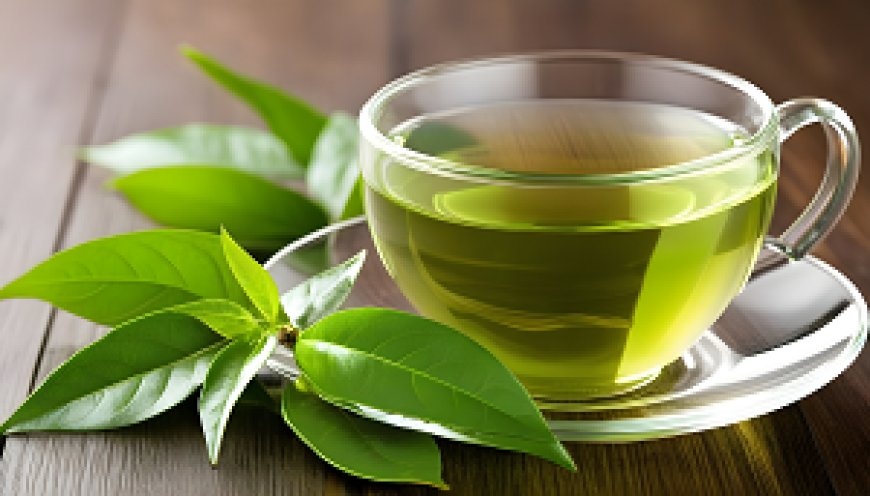Benefits of green tea and methods of preparation
Green tea is a unique beverage that is known for its multiple health benefits. It contains a high level of antioxidants, such as catechins, which are beneficial in protecting the body from cellular damage. Research indicates that consuming green tea can help improve heart health and reduce cholesterol levels. Additionally, green tea is encouraged for its potential to boost metabolism and aid in weight loss. In terms of preparation, green tea can be easily made by steeping tea leaves in hot water for a short period, preserving the valuable nutrients in the tea. You can also enhance the flavor and nutritional value by adding a splash of lemon or a sprig of mint.

Green tea is a remarkable natural beverage celebrated for its numerous health benefits and distinctive flavor. Renowned for its potent antioxidants, such as catechins, green tea actively contributes to shielding the body from free radical damage. Research suggests that incorporating green tea into one's routine can enhance heart health and reduce cholesterol levels. Additionally, green tea's metabolism-boosting properties make it a valuable asset for weight management. we will provide an overview of the health benefits of green tea and explore some easy methods for preparing this delicious and beneficial beverage.
Benefits of Green Tea for Heart and Cardiovascular Health
Green tea has been celebrated for centuries for its numerous health benefits, and its positive impact on heart and cardiovascular health is particularly noteworthy. Here are some detailed insights into the benefits of green tea in promoting a healthy heart:
1. Rich in Antioxidants:
- Catechins: Green tea is abundant in catechins, a type of natural antioxidant. Epigallocatechin gallate (EGCG), a specific catechin, is known for its powerful cardioprotective properties.
2. Lowers Bad Cholesterol (LDL):
- Cholesterol Regulation: Regular consumption of green tea has been associated with a reduction in low-density lipoprotein (LDL) cholesterol levels. High levels of LDL cholesterol can contribute to arterial plaque buildup and increase the risk of heart disease.
3. Promotes Heart Health:
- Improved Arterial Function: The antioxidants in green tea may enhance the function of the endothelial cells lining the arteries, promoting better blood vessel function. This helps regulate blood pressure and reduces the risk of cardiovascular events.
4. Blood Pressure Regulation:
- Hypertension Control: Green tea has been linked to a modest reduction in blood pressure. The catechins in green tea may help relax blood vessels, leading to lower blood pressure levels.
5. Anti-Inflammatory Properties:
- Reduced Inflammation: Chronic inflammation is a key factor in the development of heart disease. Green tea's anti-inflammatory properties may help mitigate inflammation, protecting the heart and blood vessels.
6. Antithrombotic Effects:
- Reduced Blood Clotting: Green tea may have antithrombotic effects, meaning it can help prevent abnormal blood clotting. This reduces the risk of conditions like stroke and heart attack.
7. Improved Lipid Profile:
- Triglyceride Reduction: Regular green tea consumption has been associated with lower triglyceride levels. Maintaining a healthy lipid profile is crucial for heart health.
8. Enhanced Metabolism:
- Weight Management: Green tea can contribute to weight management, and maintaining a healthy weight is important for heart health. The combination of caffeine and antioxidants in green tea may help boost metabolism and fat burning.
9. Regulates Blood Sugar:
- Type 2 Diabetes Prevention: Green tea may assist in regulating blood sugar levels, reducing the risk of developing type 2 diabetes. Diabetes is a significant risk factor for heart disease.
10. Stress Reduction:
- Calming Effects: The amino acid L-theanine in green tea has a calming effect and may help reduce stress. Chronic stress can contribute to heart problems, and managing stress is essential for cardiovascular health.
11. Heart Rhythm Stability:
- Antiarrhythmic Properties: Some studies suggest that green tea consumption may have antiarrhythmic effects, helping maintain stable heart rhythms.
12. Overall Cardiovascular Support:
- Comprehensive Protection: The combination of antioxidants, anti-inflammatory properties, and various other bioactive compounds in green tea offers comprehensive support for cardiovascular health.
Incorporating green tea into a balanced and heart-healthy lifestyle can be a valuable addition. Whether consumed hot or cold, green tea stands out as a beverage that not only delights the taste buds but also contributes to the well-being of the heart and the entire cardiovascular system. Regular consumption, combined with other heart-healthy habits, can contribute to a resilient and thriving heart.
Antioxidants in Green Tea and Their Impact on Health
Green tea is celebrated for its rich antioxidant content, and these antioxidants play a crucial role in promoting health and well-being. Here's an in-depth exploration of the antioxidants in green tea and their impact on various aspects of health:
1. Catechins:
- EGCG (Epigallocatechin Gallate): Catechins are potent antioxidants found abundantly in green tea. Among them, EGCG is particularly noteworthy for its powerful health benefits. EGCG has been associated with various positive effects, including anti-cancer properties and cardiovascular health support.
2. Polyphenols:
- Quercetin, Kaempferol, and Myricetin: Green tea contains polyphenols, which are plant-based compounds with antioxidant properties. Quercetin, kaempferol, and myricetin are examples found in green tea. These polyphenols help neutralize harmful free radicals in the body.
3. Flavonoids:
- Antioxidant Flavonoids: Flavonoids are a class of compounds with antioxidant effects. Green tea is rich in flavonoids, contributing to its ability to combat oxidative stress. These compounds may contribute to improved heart health and reduced inflammation.
4. L-Theanine:
- Stress Reduction: While not an antioxidant, L-theanine is an amino acid found in green tea. It is known for its calming effects, promoting relaxation and reducing stress. Stress reduction indirectly contributes to overall health and well-being.
5. Beta-Carotene:
- Eye Health: Green tea contains beta-carotene, which is converted into vitamin A in the body. Vitamin A is crucial for maintaining eye health and vision.
6. Chlorophyll:
- Detoxification: Chlorophyll gives green tea its vibrant color and has been associated with detoxification properties. It may help the body eliminate toxins and support liver health.
7. Vitamin C:
- Immune Support: Green tea contains vitamin C, an essential nutrient known for its immune-boosting properties. Adequate vitamin C intake is vital for a robust immune system.
8. Manganese:
- Metabolic Health: Green tea is a source of manganese, a trace mineral important for metabolic health. Manganese plays a role in bone formation and carbohydrate metabolism.
9. Anti-Inflammatory Effects:
- Reduced Inflammation: The antioxidants in green tea, particularly the catechins, have anti-inflammatory effects. Chronic inflammation is linked to various health issues, and green tea may help mitigate this inflammatory response.
10. Cardiovascular Health:
- Heart Protective: The combination of antioxidants in green tea contributes to cardiovascular health. It helps in reducing the risk of heart diseases by improving cholesterol levels, blood vessel function, and reducing blood pressure.
11. Neuroprotective Properties:
- Brain Health: Some studies suggest that the antioxidants in green tea may have neuroprotective effects, potentially reducing the risk of neurodegenerative diseases.
12. Anti-Aging Benefits:
- Cellular Protection: Antioxidants combat oxidative stress, which is a major contributor to aging. Green tea's antioxidants may help protect cells from damage, promoting a more youthful appearance.
The antioxidants in green tea contribute to its status as a health-promoting beverage. Regular consumption of green tea is associated with a range of benefits, from supporting heart health to providing cellular protection. Incorporating this beverage into a balanced lifestyle can contribute to overall well-being and vitality.
The Effect of Green Tea on Improving Brain Function and Focus
Green tea is a popular beverage that has been consumed for centuries, primarily in Asian countries. It is well-known for its numerous health benefits, and one area of interest is its potential positive effects on brain function and focus. The key components in green tea that contribute to these cognitive benefits are caffeine and L-theanine, along with other bioactive compounds.
-
Caffeine Content:
- Green tea contains caffeine, a natural stimulant that is known to improve various aspects of brain function. Caffeine works by blocking the inhibitory neurotransmitter adenosine, leading to increased levels of other neurotransmitters like dopamine and norepinephrine. These changes can enhance mood, reaction time, memory, and overall cognitive function.
-
L-theanine Content:
- Green tea also contains L-theanine, an amino acid that has a calming effect on the brain. Unlike caffeine, L-theanine promotes relaxation without causing drowsiness. The combination of caffeine and L-theanine in green tea is thought to create a synergistic effect, enhancing cognitive performance and focus. L-theanine also increases the production of the neurotransmitter gamma-aminobutyric acid (GABA), which has anti-anxiety effects.
-
Synergistic Effect of Caffeine and L-theanine:
- Studies suggest that the combination of caffeine and L-theanine can have a unique impact on cognitive function. While caffeine provides an initial boost in alertness and attention, L-theanine helps to smooth out the jittery effects of caffeine, promoting a state of relaxed alertness. This synergistic effect may contribute to improved cognitive performance and sustained focus.
-
Neuroprotective Properties:
- Green tea contains polyphenols, particularly catechins, which have antioxidant properties. These antioxidants may help protect the brain from oxidative stress and inflammation, which are implicated in neurodegenerative diseases and cognitive decline.
-
Improved Mood and Reduced Stress:
- The combination of caffeine and L-theanine in green tea may also contribute to mood enhancement and stress reduction. L-theanine's calming effect, coupled with caffeine's stimulating properties, can create a balanced mental state, potentially reducing feelings of stress and anxiety.
-
Enhanced Memory and Learning:
- Some studies suggest that green tea consumption may have positive effects on memory and learning. The neuroprotective properties of green tea, along with the caffeine-induced increase in neurotransmitters, may support better cognitive processes related to memory formation and retention.
-
Improved Blood Flow:
- Green tea has been linked to improved blood flow and a lower risk of cardiovascular diseases. Better blood flow to the brain can contribute to enhanced cognitive function by ensuring an adequate supply of oxygen and nutrients.
-
Potential for Neurogenesis:
- Some preclinical studies suggest that green tea components may have the potential to promote neurogenesis, the growth and development of new neurons in the brain. This process is essential for cognitive function and may play a role in memory and learning.
It's important to note that individual responses to green tea can vary, and excessive consumption of caffeine can lead to negative effects such as insomnia, jitteriness, and increased heart rate. Moderation is key, and it's advisable to consult with a healthcare professional, especially for individuals sensitive to caffeine or those with certain medical conditions. Incorporating green tea into a balanced and healthy lifestyle, along with proper nutrition and regular exercise, may contribute to overall cognitive well-being.
Green Tea's Role in Lowering Cholesterol Levels
Green tea has gained popularity not only as a refreshing beverage but also for its potential health benefits, including its role in lowering cholesterol levels. Several studies suggest that regular consumption of green tea may contribute to improvements in cholesterol profiles, offering a natural approach to cardiovascular health. The key components in green tea responsible for these effects include catechins, particularly epigallocatechin gallate (EGCG), and other bioactive compounds.
-
Catechins and Antioxidant Properties:
- Green tea is rich in catechins, which are a type of natural antioxidant. The predominant catechin in green tea, EGCG, has been studied for its potential to reduce oxidative stress and inflammation. These properties are important for cardiovascular health because oxidative stress and inflammation contribute to the development of atherosclerosis and elevated cholesterol levels.
-
LDL Cholesterol Reduction:
- Low-density lipoprotein (LDL) cholesterol, often referred to as "bad" cholesterol, is a major risk factor for cardiovascular diseases. Some studies suggest that green tea consumption can lead to a reduction in LDL cholesterol levels. The antioxidant properties of catechins are thought to play a role in preventing the oxidation of LDL cholesterol, which is a crucial step in the development of atherosclerosis.
-
Increased HDL Cholesterol:
- High-density lipoprotein (HDL) cholesterol is considered "good" cholesterol because it helps remove LDL cholesterol from the bloodstream. Green tea consumption has been associated with an increase in HDL cholesterol levels. This is important for maintaining a healthy lipid profile and reducing the risk of heart disease.
-
Triglyceride Levels:
- Elevated triglyceride levels are another risk factor for cardiovascular diseases. Some studies suggest that green tea may have a positive impact on triglyceride levels, although the evidence is not as consistent as it is for LDL and HDL cholesterol. Nevertheless, the potential triglyceride-lowering effect of green tea adds to its overall cardiovascular benefits.
-
Improvement in Lipid Metabolism:
- Green tea has been shown to influence lipid metabolism, which includes the synthesis, storage, and breakdown of fats in the body. By modulating these processes, green tea may contribute to a more favorable lipid profile. This modulation may involve the inhibition of enzymes involved in fat absorption and synthesis.
-
Anti-Inflammatory Effects:
- Chronic inflammation is linked to various cardiovascular diseases, including those associated with high cholesterol levels. Green tea's anti-inflammatory properties, attributed to its catechin content, may help mitigate inflammation and contribute to the overall reduction in cardiovascular risk.
-
Endothelial Function Improvement:
- The endothelium, the inner lining of blood vessels, plays a crucial role in regulating vascular health. Green tea has been associated with improvements in endothelial function, which can positively impact blood vessel dilation and overall cardiovascular health. Enhanced endothelial function contributes to the prevention of plaque formation and improves blood flow.
-
Blood Pressure Regulation:
- While the primary focus is on cholesterol levels, it's worth noting that green tea has also been associated with modest reductions in blood pressure. Lowering blood pressure is another important factor in reducing the overall risk of cardiovascular diseases.
It's important to note that while the research on the cholesterol-lowering effects of green tea is promising, individual responses may vary. Moreover, the benefits are likely to be more pronounced when green tea is part of a healthy lifestyle, including a balanced diet, regular exercise, and avoidance of smoking. Green tea can be a valuable addition to cardiovascular health strategies, but it should not be considered a sole solution. As always, individuals with specific health concerns should consult with healthcare professionals for personalized advice.
Impact of Green Tea on Weight Loss and Weight Management
Green tea has garnered considerable attention for its potential role in weight loss and weight management. Several studies have explored the impact of green tea on metabolism, fat burning, and overall body composition. The key components in green tea believed to contribute to these effects include caffeine and catechins, particularly epigallocatechin gallate (EGCG).
1. Caffeine Content:
- Green tea contains caffeine, a natural stimulant known to enhance metabolic rate and increase fat oxidation. Caffeine achieves this by boosting the release of norepinephrine, a hormone that signals the body to break down fat cells. The increased metabolic rate can contribute to weight loss and improved energy expenditure.
2. Catechins, Especially EGCG:
- Catechins, particularly EGCG, are abundant in green tea and have been studied for their potential effects on weight loss. EGCG is believed to enhance fat metabolism and increase the burning of calories. It may also play a role in inhibiting the absorption of fats from the digestive tract.
3. Thermogenic Properties:
- Green tea is considered to have thermogenic properties, meaning it can increase the body's production of heat. This process, known as thermogenesis, may contribute to the burning of calories and, consequently, aid in weight loss.
4. Improved Fat Oxidation during Exercise:
- Some studies suggest that green tea consumption can enhance fat oxidation during exercise. This is particularly relevant for individuals engaged in physical activity as it may contribute to more efficient energy utilization and potentially improve endurance.
5. Appetite Suppression:
- Green tea may have appetite-suppressing effects, potentially attributed to its combination of caffeine and catechins. While the mechanisms are not fully understood, these components may influence hormones that regulate hunger, leading to reduced caloric intake.
6. Blood Sugar Regulation:
- Green tea has been linked to improved insulin sensitivity and better blood sugar control. By regulating blood sugar levels, green tea may help prevent spikes and crashes in energy, reducing the likelihood of overeating or cravings for sugary snacks.
7. Fat Absorption Inhibition:
- Catechins in green tea, particularly EGCG, may interfere with the absorption of dietary fats in the digestive tract. This could potentially lead to a decrease in overall calorie absorption and contribute to weight management.
8. Long-Term Effects on Body Composition:
- Some studies suggest that the regular consumption of green tea over an extended period may lead to changes in body composition, including a reduction in body fat percentage. These long-term effects emphasize the potential of green tea as a component of a weight management strategy.
9. Synergistic Effects with Exercise:
- Green tea's benefits on weight management may be enhanced when combined with regular exercise. The thermogenic properties, improved fat oxidation, and energy-boosting effects of green tea can complement physical activity, potentially resulting in more effective weight loss.
10. Overall Health Benefits:
- Beyond weight loss, green tea offers numerous health benefits, including antioxidant properties that contribute to overall well-being. The combination of weight management and improved health markers makes green tea a valuable addition to a healthy lifestyle.
It's important to note that while research suggests a positive association between green tea consumption and weight loss, individual responses can vary. Additionally, the effectiveness of green tea in weight management is likely to be more significant when combined with a balanced diet and regular physical activity. As with any dietary strategy, consulting with a healthcare professional is advisable, especially for individuals with underlying health conditions or those sensitive to caffeine.
Benefits of Green Tea for Skin Health and Delaying Signs of Aging
Green tea is renowned for its numerous health benefits, and its positive effects on skin health and aging have become particularly noteworthy. Packed with antioxidants and other bioactive compounds, green tea can contribute to a radiant complexion and help delay the signs of aging. Here's an in-depth look at the benefits of green tea for skin health:
1. Antioxidant Properties:
- Green tea is rich in antioxidants, particularly catechins and polyphenols. These antioxidants help combat oxidative stress caused by free radicals in the body. By neutralizing free radicals, green tea protects the skin from damage and supports overall skin health.
2. Anti-Inflammatory Effects:
- Inflammation is a common factor in various skin issues, including acne and aging. The anti-inflammatory properties of green tea can help soothe irritated skin, reduce redness, and alleviate conditions associated with inflammation.
3. Sun Protection:
- The polyphenols in green tea, especially EGCG, have been shown to provide some level of protection against the harmful effects of ultraviolet (UV) radiation from the sun. While it's not a substitute for sunscreen, incorporating green tea into your skincare routine may offer additional support against sun damage.
4. Improvement in Complexion:
- Regular consumption of green tea or the application of green tea extracts can contribute to a clearer and brighter complexion. The antioxidants in green tea help flush out toxins and promote a healthy glow by supporting the skin's natural detoxification processes.
5. Hydration and Moisturization:
- Green tea contains components that assist in maintaining skin moisture. Proper hydration is essential for healthy skin, and green tea can contribute to a well-hydrated and nourished complexion.
6. Treatment of Acne and Blemishes:
- The antimicrobial and anti-inflammatory properties of green tea make it a potential aid in the treatment of acne. Green tea extracts have been incorporated into skincare products to help reduce acne and prevent the formation of blemishes.
7. Collagen Preservation:
- Collagen is a protein that provides structural support to the skin. As we age, collagen production decreases, leading to sagging and wrinkles. Green tea's antioxidants may help preserve collagen, contributing to the skin's elasticity and firmness.
8. Reduced Puffiness and Dark Circles:
- The caffeine content in green tea can constrict blood vessels and reduce puffiness around the eyes. Additionally, the antioxidants help improve blood circulation, potentially minimizing dark circles and promoting a more rejuvenated appearance.
9. Delaying Signs of Aging:
- The combined effects of antioxidant protection, collagen preservation, and anti-inflammatory properties contribute to delaying the visible signs of aging. Regular use of green tea in skincare routines may help minimize fine lines, wrinkles, and age spots.
10. Skin Cancer Prevention:
- Some studies suggest that the polyphenols in green tea may have protective effects against certain types of skin cancer. While not a substitute for sunscreen, incorporating green tea into your lifestyle may offer additional support in preventing skin cancer.
11. DIY Face Masks and Topical Application:
- Green tea can be applied topically to the skin or used in DIY face masks. The antioxidants and polyphenols are absorbed directly, providing a refreshing and rejuvenating experience. Topical application can enhance the skin benefits of green tea.
12. Reduction in Redness and Irritation:
- Conditions like rosacea and sensitive skin can benefit from the anti-inflammatory properties of green tea. It helps in reducing redness and calming irritated skin, providing relief to those with sensitive skin.
13. Even Skin Tone:
- Green tea may contribute to achieving a more even skin tone by reducing hyperpigmentation and dark spots. It inhibits melanin production, resulting in a more uniform complexion.
14. Prevention of Skin Cell Damage:
- The antioxidants in green tea protect skin cells from damage caused by environmental pollutants and UV radiation. This prevention of cell damage supports overall skin health and resilience.
15. Promotion of Skin Regeneration:
- Green tea's properties may support skin regeneration and repair. This can be beneficial for those with scars or uneven skin texture, promoting a smoother and healthier skin appearance.
Incorporating green tea into your skincare routine, whether through topical applications or regular consumption, can provide a holistic approach to promoting skin health and delaying the signs of aging. It's important to note that individual responses may vary, and maintaining a healthy lifestyle, including a balanced diet and proper skincare, complements the benefits of green tea for the skin. Always consider consulting with a dermatologist or skincare professional for personalized advice based on your specific skin type and concerns.
Green Tea and Improving Digestion and Digestive Health
Green tea has gained recognition not only for its delightful taste but also for its potential health benefits, including its positive impact on the immune system. The immune system plays a crucial role in defending the body against infections and illnesses. Here's a detailed exploration of how green tea can influence and boost the immune system:
1. Antioxidant Content:
- Green tea is rich in antioxidants, particularly polyphenols such as catechins. These antioxidants help neutralize free radicals in the body, which can cause cellular damage. By reducing oxidative stress, green tea supports overall health and helps the immune system function optimally.
2. Epigallocatechin Gallate (EGCG):
- The catechin epigallocatechin gallate (EGCG) is a potent compound found in green tea. EGCG has been studied for its anti-inflammatory and antimicrobial properties, which can contribute to the prevention of infections and the enhancement of immune function.
3. Anti-Inflammatory Effects:
- Chronic inflammation can weaken the immune system over time. Green tea has anti-inflammatory properties that may help reduce inflammation in the body, thereby supporting a healthier immune response.
4. Enhanced Immune Cell Activity:
- Green tea has been linked to the activation of various immune cells, including T cells, which play a crucial role in the immune response. Improved activity of these cells can enhance the body's ability to combat infections and diseases.
5. Protection Against Viral Infections:
- Some studies suggest that the compounds in green tea, particularly EGCG, may provide protection against certain viral infections. While not a substitute for vaccines or antiviral medications, incorporating green tea into a healthy lifestyle may offer additional support in preventing viral illnesses.
6. Boosting Antibody Production:
- Green tea consumption has been associated with an increase in the production of antibodies. Antibodies are proteins that play a key role in recognizing and neutralizing harmful substances like bacteria and viruses, contributing to a more robust immune defense.
7. Regulation of Immune Response:
- Green tea may help modulate the immune system's response, preventing it from becoming overactive or underactive. A balanced immune response is crucial for maintaining health and preventing autoimmune conditions.
8. Gut Health and Immunity:
- The health of the gut microbiota is closely linked to immune function. Green tea has been shown to have a positive impact on gut health by promoting the growth of beneficial bacteria. A healthy gut microbiome supports a strong immune system.
9. Reducing the Risk of Chronic Diseases:
- By combating inflammation and oxidative stress, green tea may contribute to a lower risk of chronic diseases. Conditions like heart disease, diabetes, and certain cancers are influenced by immune system health, and green tea's properties can potentially offer protective effects.
10. Stress Reduction:
- Chronic stress can weaken the immune system. Green tea contains an amino acid called L-theanine, which has calming effects and may help reduce stress. By promoting a sense of relaxation, green tea indirectly supports immune health.
11. Improving Respiratory Health:
- Green tea has been explored for its potential benefits in respiratory health. The anti-inflammatory and antioxidant properties may be supportive in conditions affecting the respiratory system, contributing to overall immune well-being.
12. Balancing Hormones:
- Hormonal balance is essential for a healthy immune system. Green tea, with its regulatory effects on various hormones, may contribute to maintaining a balanced immune response.
13. Adaptogenic Properties:
- Green tea is considered an adaptogen, meaning it may help the body adapt to stressors. This adaptogenic quality can contribute to overall resilience, supporting the immune system during challenging situations.
14. Hydration and Detoxification:
- Proper hydration is crucial for immune function. Green tea, when consumed as part of a well-balanced diet, contributes to overall hydration. Additionally, its natural detoxifying properties may assist in eliminating harmful substances from the body.
15. Complementary Role in Overall Health:
- Green tea's immune-boosting effects are part of its broader role in promoting overall health. When combined with a healthy lifestyle, including regular exercise, a balanced diet, and sufficient sleep, green tea becomes a valuable component of a holistic approach to well-being.
It's important to note that while green tea can contribute to a stronger immune system, it is not a cure or sole preventive measure for illnesses. Maintaining a healthy lifestyle, practicing good hygiene, and following medical guidelines are essential components of overall immune health. As with any dietary or lifestyle changes, it's advisable to consult with healthcare professionals for personalized advice, especially for individuals with specific health conditions or concerns.
How to Choose and Store the Best Types of Green Tea
Choosing and storing the best types of green tea involves considering various factors, including the tea variety, quality, and storage conditions. Here's a detailed guide on how to make the right choices and ensure proper storage for the best green tea experience:
1. Types of Green Tea:
-
Matcha:
- Description: Finely ground powdered green tea.
- Selection: Look for vibrant green color and a smooth, non-grainy texture.
- Storage: Store in an airtight container in a cool, dark place.
-
Sencha:
- Description: Steamed green tea leaves, often with a grassy flavor.
- Selection: Choose bright green leaves and avoid stale or yellowish ones.
- Storage: Keep in a sealed container away from moisture and light.
-
Dragon Well (Longjing):
- Description: Pan-fried green tea with a chestnut-like flavor.
- Selection: Opt for flat, smooth, and vibrant green leaves.
- Storage: Store in a cool, dark place to preserve freshness.
-
Genmaicha:
- Description: Green tea combined with roasted brown rice.
- Selection: Check for a balanced blend of tea leaves and roasted rice.
- Storage: Keep in an airtight container to retain the roasted aroma.
-
Gyokuro:
- Description: Shade-grown green tea with a sweet and savory taste.
- Selection: Look for vibrant green, needle-like leaves.
- Storage: Store in a cool, dark place to maintain its delicate flavor.
2. Considerations for Choosing:
-
Quality:
- Choose high-quality loose-leaf tea for a richer flavor and aroma.
- Check for freshness by examining the color, texture, and aroma of the leaves.
-
Source:
- Purchase from reputable sources or specialty tea shops for authenticity.
- Consider tea from specific regions known for producing high-quality green tea.
-
Flavor Preferences:
- Experiment with different varieties to find the flavor profile you enjoy.
- Consider the level of umami, sweetness, and astringency in your preferred green tea.
3. Storage Tips:
-
Airtight Containers:
- Transfer tea to airtight containers to protect it from moisture and odors.
- Use opaque containers or store in a dark place to prevent light degradation.
-
Cool and Dry Environment:
- Store green tea in a cool, dry place away from direct sunlight.
- Avoid storing near strong-smelling items, as tea leaves can absorb odors.
-
Avoid Excessive Heat:
- Keep green tea away from heat sources, such as stoves or ovens.
- Extreme heat can accelerate the deterioration of the tea's flavor.
-
Refrigeration (Optional):
- While not necessary for all green teas, refrigeration can help extend the shelf life of more delicate varieties.
- Use a sealed container to prevent the tea from absorbing moisture.
-
Consumption Timeline:
- Consume green tea within a reasonable timeframe for optimal freshness.
- Fresher tea generally provides a more flavorful and aromatic experience.
4. Common Mistakes to Avoid:
-
Buying in Bulk:
- Avoid buying excessive quantities, especially if you don't consume tea regularly.
- Tea loses freshness over time, impacting its flavor.
-
Incorrect Storage:
- Improper storage, such as leaving tea exposed to air or light, can lead to flavor degradation.
- Inadequate storage can also result in the absorption of unwanted odors.
-
Storing Near Strong Odors:
- Green tea easily absorbs odors, so avoid storing it near strong-smelling items.
- Keep it away from spices, herbs, or any scented products.
-
Using Transparent Containers:
- Transparent containers expose tea to light, leading to a loss of flavor and aroma.
- Opt for opaque or UV-resistant containers for storage.
Choosing and storing the best green tea involves a combination of selecting high-quality varieties, considering personal flavor preferences, and implementing proper storage practices. By following these guidelines, you can enjoy a consistently flavorful and aromatic cup of green tea.
The Influence of Additions such as Lemon or Mint on the Taste of Green Tea
The addition of ingredients like lemon or mint to green tea can significantly influence its taste, providing a refreshing and flavorful twist to this already versatile beverage. Here's a detailed exploration of how these additions impact the taste of green tea:
1. Lemon:
-
Flavor Profile:
- Lemon adds a bright and citrusy flavor to green tea. The acidity of lemon complements the earthy and grassy notes of green tea, creating a well-balanced and refreshing taste.
-
Benefits:
- Vitamin C Boost: Lemon is a rich source of vitamin C, which adds a nutritional boost to your green tea.
- Enhanced Antioxidant Effect: The combination of lemon and green tea's natural antioxidants may have a synergistic effect, potentially increasing the overall antioxidant activity.
-
How to Add:
- Squeeze fresh lemon juice into your green tea.
- Add a slice of lemon to your tea for visual appeal and an extra burst of flavor.
- Experiment with the amount of lemon juice to find the balance that suits your taste preferences.
2. Mint:
-
Flavor Profile:
- Mint imparts a cool and refreshing flavor to green tea. It adds a hint of sweetness and a soothing menthol undertone, creating a revitalizing and aromatic experience.
-
Benefits:
- Digestive Aid: Mint is known for its digestive properties and can help soothe the stomach.
- Breath Freshener: The menthol in mint provides a natural breath freshening effect.
-
How to Add:
- Add fresh mint leaves to your green tea for a burst of flavor.
- Use mint tea bags or dried mint leaves if fresh mint is not available.
- Experiment with the steeping time to control the intensity of the mint flavor.
3. Combination of Lemon and Mint:
-
Flavor Profile:
- Combining lemon and mint creates a dynamic and invigorating flavor profile. The citrusy notes of lemon complement the coolness of mint, resulting in a well-rounded and refreshing taste.
-
Benefits:
- Hydration: Lemon and mint add flavor without the need for added sugars, making the tea a hydrating and healthy option.
- Aromatherapy: The aroma of lemon and mint can have a positive impact on mood and mental alertness.
-
How to Add:
- Combine fresh lemon slices and mint leaves in your green tea.
- Experiment with the ratio of lemon to mint to find the combination that suits your taste.
4. Honey or Sweeteners:
-
Flavor Profile:
- The addition of honey or sweeteners can enhance the sweetness of green tea. This is particularly useful if you find green tea to be slightly bitter.
-
Benefits:
- Natural Sweetness: Honey provides a natural sweetness, and its floral notes can complement the earthiness of green tea.
- Customizable Sweetness: Sweeteners allow you to customize the level of sweetness according to your taste preferences.
-
How to Add:
- Stir in a teaspoon of honey or your preferred sweetener into your green tea.
- Experiment with different sweeteners like agave syrup or stevia for a unique taste.
Tips for Experimenting:
-
Start with Small Amounts:
- When experimenting with additions, start with small amounts and adjust to your taste gradually.
-
Fresh Ingredients:
- Whenever possible, use fresh ingredients like freshly squeezed lemon juice or mint leaves for the best flavor.
-
Temperature Consideration:
- Adjust the temperature of your water based on personal preference. Cooler water may enhance the freshness of additions like mint.
-
Quality Green Tea:
- Use high-quality green tea as a base to ensure a rich and robust foundation for the added flavors.
-
Personalize to Taste:
- The beauty of green tea lies in its versatility. Personalize your tea by experimenting with different combinations until you find your perfect blend.
the addition of lemon, mint, honey, or other sweeteners to green tea can transform it into a delightful and personalized beverage. Whether you prefer a zesty citrus kick or a soothing minty freshness, these additions offer a wide range of options to suit your taste preferences and enhance your overall tea-drinking experience.
Best Times to Consume Green Tea for Maximum Benefits
The timing of green tea consumption can impact its effectiveness and benefits. Here's a detailed exploration of the best times to consume green tea for maximum health benefits:
1. Morning:
-
Benefits:
- Boosts Metabolism: Green tea contains caffeine and catechins, which can enhance metabolic rate and aid in weight management. Consuming it in the morning can kickstart your metabolism for the day.
- Increases Alertness: The moderate caffeine content in green tea provides a gentle energy boost without the jitters, promoting alertness and focus.
-
How to Consume:
- Enjoy a cup of green tea as a morning beverage, either with or without breakfast.
- Consider pairing it with a light, healthy breakfast for a balanced start to your day.
2. Before Exercise:
-
Benefits:
- Improved Fat Burning: The combination of caffeine and catechins in green tea can enhance fat oxidation, making it an excellent choice before exercise.
- Enhanced Physical Performance: Caffeine can improve physical performance by increasing adrenaline levels, potentially leading to better exercise outcomes.
-
How to Consume:
- Drink green tea about 30 minutes to an hour before your workout for optimal effects.
- Avoid consuming it on an empty stomach to prevent potential discomfort.
3. Between Meals:
-
Benefits:
- Appetite Control: Green tea may help regulate appetite and reduce cravings, making it a good choice between meals.
- Stabilizes Blood Sugar: Some studies suggest that green tea can have a positive impact on blood sugar levels, contributing to better overall health.
-
How to Consume:
- Have a cup of green tea between meals to manage hunger and maintain energy levels.
- Consider pairing it with a small, healthy snack.
4. After Meals:
-
Benefits:
- Aids Digestion: Green tea has been associated with improved digestion. Consuming it after meals may help in the digestion process.
- Controls Blood Sugar: Some research suggests that green tea can help regulate blood sugar levels after a meal.
-
How to Consume:
- Wait at least 30 minutes after a meal before having green tea to allow for proper digestion.
- Opt for caffeine-free green tea if you're sensitive to caffeine in the evenings.
5. Mid-Afternoon Slump:
-
Benefits:
- Sustained Energy: Green tea provides a moderate caffeine boost without the crash, making it a good choice during the mid-afternoon energy slump.
- Improved Focus: The combination of caffeine and L-theanine in green tea can enhance cognitive function and focus.
-
How to Consume:
- Have a cup of green tea in the mid-afternoon to combat fatigue and maintain productivity.
- Choose a lower-caffeine green tea option if you're sensitive to caffeine later in the day.
6. Evening (Decaffeinated):
-
Benefits:
- Relaxation: Opt for decaffeinated green tea in the evening to enjoy its calming effects without the stimulating impact of caffeine.
- Antioxidant Boost: Green tea is rich in antioxidants, which can promote overall health, even without the caffeine.
-
How to Consume:
- Choose decaffeinated green tea in the evening to unwind and enjoy its soothing properties.
- Avoid caffeinated green tea close to bedtime to ensure a good night's sleep.
General Tips:
-
Consistency is Key:
- Aim for consistency in your green tea consumption to maximize its long-term benefits.
-
Avoid Excessive Consumption:
- While green tea is generally safe for most people, excessive intake may lead to negative effects. Moderation is key.
-
Consider Individual Sensitivity:
- Pay attention to how your body responds to green tea, especially if you're sensitive to caffeine.
-
Quality Matters:
- Choose high-quality green tea for better flavor and maximum health benefits.
-
Personalize Your Routine:
- Adjust the timing of your green tea consumption based on your personal preferences, lifestyle, and response to caffeine.
Incorporating green tea into your daily routine at strategic times can enhance its positive effects on metabolism, energy levels, and overall well-being. Adjust the timing based on your preferences and individual needs for the best results.
Methods of Green Tea Preparation
Green tea is a popular beverage known for its delicate flavor and numerous health benefits. The process of preparing green tea involves various methods, each influencing the flavor profile and the overall experience. Here's a detailed exploration of the common methods of green tea preparation: steeping, infusing, and brewing.
1. Steeping:
-
Process:
- Steeping is the most straightforward method of preparing green tea. It involves immersing tea leaves in hot water to extract flavors.
- Boil water, and let it cool slightly to around 80-85°C (176-185°F) for green tea, as using boiling water can result in a bitter taste.
- Place green tea leaves or a tea bag in a teapot or teacup.
- Pour the hot water over the tea leaves, covering them completely.
- Let the tea steep for 1-3 minutes. Steeping time depends on the type of green tea and personal preference. Shorter steeping times generally result in a milder flavor.
- Strain the leaves or remove the tea bag to prevent over-steeping.
-
Ideal for:
- Steeping is suitable for most loose-leaf green teas and some green tea bags.
- It's a preferred method for delicate green teas like Japanese Gyokuro or high-quality Sencha.
-
Tips:
- Use fresh, filtered water for the best taste.
- Experiment with different steeping times to find the flavor intensity you prefer.
2. Infusing:
-
Process:
- Infusing green tea involves a longer steeping time than traditional steeping.
- Boil water and let it cool slightly.
- Place the green tea leaves in a container or teapot.
- Pour the hot water over the leaves and allow the tea to infuse for a more extended period, often 2-5 minutes.
- The resulting brew is typically stronger and can be enjoyed over multiple infusions.
-
Ideal for:
- Infusing is suitable for some high-quality green teas that can withstand longer steeping times.
- It's commonly used in Chinese tea ceremonies for teas like Dragon Well (Long Jing) or Bi Luo Chun.
-
Tips:
- Use a teapot with a built-in strainer or a tea infuser for easy removal of leaves.
- Experiment with multiple infusions to explore changes in flavor with each steep.
3. Brewing:
-
Process:
- Brewing green tea is a more involved process similar to that of other hot beverages like coffee. It often involves a more significant amount of tea leaves and a longer brewing time.
- Measure the desired amount of green tea leaves into a teapot or brewing vessel.
- Boil water and allow it to cool slightly.
- Pour the hot water over the tea leaves, covering them completely.
- Allow the tea to brew for a longer period, typically 3-5 minutes.
- Some brewing methods involve multiple steeping rounds.
-
Ideal for:
- Brewing is suitable for robust green teas like Chinese Gunpowder or Japanese Bancha.
- It's commonly used in Gongfu tea ceremonies.
-
Tips:
- Adjust the amount of tea leaves and brewing time based on personal preference.
- Brewing allows for a more immersive tea experience, often appreciated by tea connoisseurs.
General Tips for Green Tea Preparation:
-
Water Quality:
- Use fresh, filtered water to avoid impurities affecting the taste.
-
Temperature Control:
- Green tea is sensitive to water temperature. Avoid boiling water; instead, let it cool slightly before brewing.
-
Teaware:
- Use a teapot, teacup, or brewing vessel suitable for the chosen method.
-
Experimentation:
- Adjust the quantity of tea leaves, water temperature, and steeping times to find the ideal combination for your taste preferences.
-
Freshness:
- Use fresh green tea leaves for the best flavor. Stale leaves can result in a flat-tasting brew.
-
Multiple Infusions:
- Some high-quality green teas can be infused multiple times, with each infusion revealing different nuances of flavor.
Whether you prefer the simplicity of steeping, the elegance of infusing, or the precision of brewing, the method of green tea preparation adds to the enjoyment of this ancient and cherished beverage. Explore these techniques to discover the subtleties of flavor and aroma inherent in different varieties of green tea.
In conclusion
green tea emerges as an effective beverage choice for improving health and enhancing overall well-being. Its numerous health benefits, including its ability to protect the heart and boost metabolism, make it an excellent option for individuals seeking to enhance their lifestyle. Green tea can be easily and creatively prepared, whether for daily consumption or to savor a quiet moment. With its delightful balance of flavor and health benefits, green tea remains a distinctive choice worth favoring.
Sources
Green Tea Benefits:
- Mayo Clinic - Green tea: Health benefits
- WebMD - Green Tea Health Benefits
- Healthline - 10 Proven Benefits of Green Tea
How to Prepare Green Tea:
What's Your Reaction?












































































































